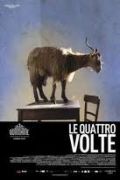
Italy/Germany/Switzerland 2010
Directed by
Michelangelo Frammartino
88 minutes
Rated PG
Reviewed by
Bernard Hemingway

Quattro Volte, Le
Synopsis: A portrait of life in a remote village perched high on the hills of Calabria in Southern Italy.Michelangelo Frammartino’s Le Quattro Volte is a both plot and dialogue-free meditation on a largely lost world of rusticated simplicity that sone might see as a patronizing, even exploitative, romanticisation of the same. A good part of the film is given over the close observation of a decrepit goat-herder and his flock. About midway through the film he dies and Frammartino takes up the obscure sequence that opened the film and whicb we now come to realise is the work of the local charcoal burners.
Le Quattro Volte is in essence an ode to the endless cycle of Life and Mother Nature, a theme most clearly stated in the film’s cutting from the demise of the old man to the birth of a baby goat. In a related way the director keeps returning to the same camera position, high above the road which goes past the old man’s house from where we witness the cycle of mundane human activity. All this is documented quite beautifully with the emphasis is on the unchanging routine, or what less sympathetic people might see as the monotony, of rural life.
If you feel that you belong on the latter camp, short of a Damascene epiphany, Le Quattro Volte won’t be for you. If however you liked Into Great Silence, the 2005 film about life in a monastery of the reclusive Carthusian Order in France, this may well work for you as a meditative reflection on the deep rhythms of life, a reality rarely glimpsed in our contemporary technologized lives. In this respect Frammartino’s film is much more a reminder of what remains than a remembrance of things lost.

Want more about this film?


Want something different?




